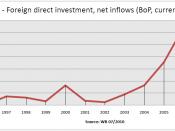Section 1: Introduction
Multinational enterprises (MNEs) like Bata must operate in countries with different political and legal conditions, so the political impact on the foreign investments is very important. This paper explains this issue based on the Bata case in three parts. The first part evaluates the different ways in which Bata has interacted with foreign political systems in its investments and operations aboard. In the second part, the advantages and disadvantages, which MNEs bring to their company and the host-country when doing foreign direct investment, are analyzed relating to the Bata case. And the last part gives a detailed analysis of the complex political impact on international business with reference to the political environment in general; also supply the way of formulating effective political strategy.
Section 2: Evaluate the different ways in which Bata has interacted with foreign political systems in its investments and operations aboard.
2.1 Bata's effective organizational structure and managing style
With activities in 60 countries, Canada-based Bata Shoe Organization has much operational experience both in developed countries and developing countries and can deal with different political systems.
It has an effective organization structure, which consists of
÷ Bata Limited located in Toronto, Canada, acts as headquarters of the operating companies. Regional offices exist in Toronto, Mexico City, Singapore, Paris, Calcutta and Harare.
÷ The International structure: a decentralized organization, where operating companies are independent businesses, supported by a global management team.
÷ Private Ownership: Bata shoe organization companies have also entered into a number of joint ventures, retail franchising and brand licensing agreements [1].
By and large Bata's operations are independent units established in each country where the firm does business. As such, Bata is able to decentralize control of its political strategy--giving subsidiaries significant autonomy in managing relations with their respective government. For example,


